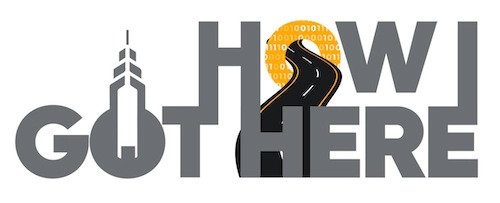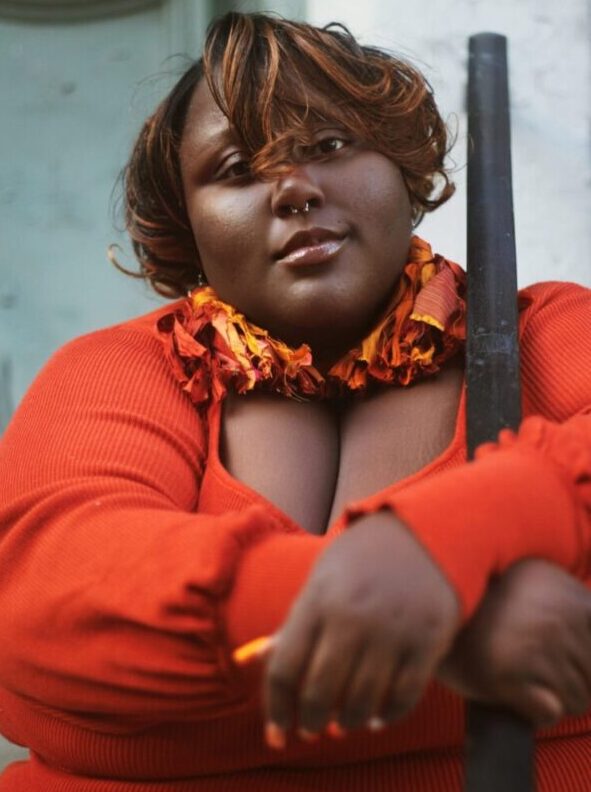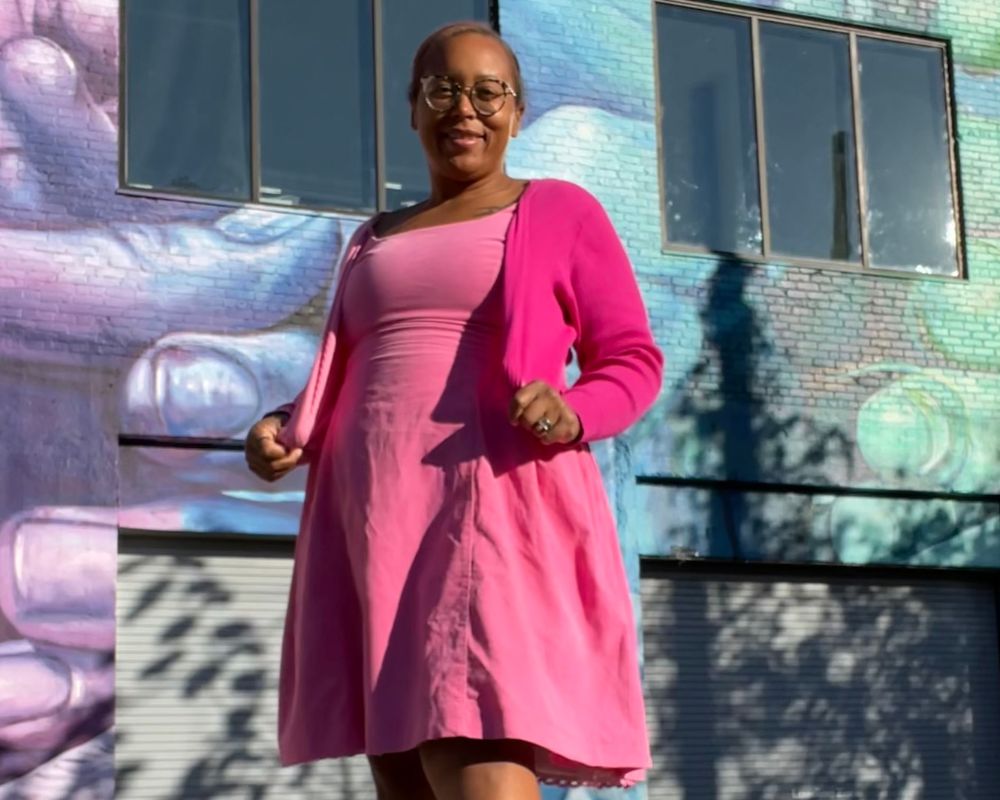
This is How I Got Here, a series where we chart the career journeys of technologists. Want to tell your story? Get in touch.
For this artist and self-proclaimed community cultivator, working at the intersection of art and technology came about when having access to materials and tools was limited. She started working with Baltimore’s largest community of maker professionals when she needed access to a CNC router. That opened new possibilities for this mother, volunteer and friend to many in Baltimore.
April Danielle Lewis, the director of community and culture at Open Works, entered the maker movement with little prior knowledge. Despite always making things throughout her life, she never identified herself as a “maker.” It was during her time at Open Works that she realized many creators — particularly those from marginalized backgrounds — also didn’t associate themselves with the maker movement. This revelation led Lewis to acknowledge the exclusivity prevalent in traditional makerspaces.
Motivated by the lack of intentional equity and inclusion, Lewis found inspiration in Open Works.
“There are far fewer spaces leading with intention around equity and inclusion in making,” she said. “So we’re on a somewhat uncharted path and there’s not a ton of guidance out there about how to do this.”
Lewis never would have been able to complete some of her larger and better-known light artworks if she didn’t have access to a CNC router. The Towson University alum was no stranger to making do with what she had since she graduated with an art, design and printmaking-focused degree during the Great Recession. That was when she realized that she chose a field of artistic practice that was not sustainable without access to a facility.
Remember that we all have value and something to add.April Danielle Lewis Open Works
Without a public printmaking option at the time, she pivoted to dog-walking. This job had her walking all over the city, and one of the first things that she said fascinated her was the city’s biodiversity.
“I paid a lot of attention to the weeds that grew in Baltimore and wondered how they ended up there,” she said. “My curiosity led me to delve into researching the history of those plants and the relationship that many weeds in Black neighborhoods have.”
The position similarly influenced her own artistic work, which increasingly tackled race and the Black experience.
“Walking the pups, I often found myself walking in non-white neighborhoods,” she recounted. “In some neighborhoods and at times, I would have the police called on me, which made me start examining my relationship with being a Black person in Baltimore. … It beckoned to be addressed in my work.
Technical.ly recently spoke with Lewis as she searched for a DIG Maker Fellow Program Manager at Open Works. She discussed the importance of accessibility and inclusivity in non-traditional tech paths, the power of community and collaboration fueled by persistence and resilience and advice for individuals seeking empowerment. This interview has been edited for brevity and clarity.
Apply to work with Lewis at Open Works
Talk about your first projects at the intersections of art, technology and design. What have you been up to in recent years?
The weeds project became my first exploration of examining some of the inequities and how they manifest in my daily life. Since I still couldn’t access materials for printmaking materials, I started collecting things. I gathered weed samples, took lots of photos and ended up creating installation art, performances, or public interventions based on my experiences. I aimed to create experiences in spaces that would make people question what it feels like to be in a particular place and prompt self-examination. That then became the essence of my art practice. Over time, it has evolved into working on community art projects, which has been my recent focus.
I love engaging people by asking them a question and collecting their feedback like with the solar-powered, open-source router kits in large damage-resistant containers that will be deployed in Baltimore this spring and summer. It’s a great pleasure to use community responses to create artistic performances or sculptures, facilitating conversations about difficult topics.

Photos from April Danielle Lewis’ Light City installation. (Courtesy photos, composite image by Technical.ly)
Another example would be: During my project for Light City or Neighborhood Lights, I asked people about what made them feel safe and how they perceived the lights in their neighborhood. Last year, I worked on the Signal Station North project and created a work called “We’re Here,” which focused on visibility. I hosted workshops where I asked people how they wanted to be seen, aiming to highlight their humanity. We celebrated this by organizing a parade or walk along North Avenue, with participants wearing shirts they had made.
In some neighborhoods and at times, I would have the police called on me, which made me start examining my relationship with being a Black person in Baltimore. … It beckoned to be addressed in my work.April Danielle Lewis Open Works
Could you share some examples of individuals who have successfully entered the industry through unconventional routes?
I think one of our biggest success stories is Lawrence Moore and Darryl Patterson of Asé Design Studio. Lawrence is a former Station North Tool Library volunteer and initially did not have woodworking skills but learned through classes at the Tool Library. At the time, he had a day job as an elementary school teacher and woodworking was just a hobby for him. Through tinkering and access to tools and equipment, Lawrence joined our member community at Open Works and even worked part-time as a technician during our first year. Lawrence received training on the CNC router and met his now-business partner Darryl Patterson. Darryl is an older gentleman who had a government job but turned to woodworking after an accident in which he lost a finger. Darryl had been using the tool library before Open Works was established, but with the availability of more hours and resources at Open Works, he spent a lot of time here creating beautiful home goods.
When they first started working together, Lawrence focused on digital fabrication using laser cutters and CNC routers, while Darrell specialized in traditional woodworking. Their friendship and collaboration allowed both of their businesses to grow independently. They eventually secured their own production facility with a full woodshop, and although they still utilize the digital fabrication tools at Open Works through a monthly membership, most of their work now happens in their own space.
This story showcases how individuals with non-making professions found their way to making through Open Works, and the intentional design of our shared space fosters a sense of community and collaboration.
What about the Black women makers like yourself? Any shining examples of success?
Another inspiring story is that of [Made In Baltimore program alum] Alisa Brock. Alisa joined the Open Works through her work with Drama MaMa Bookshop. During one of the first years of Open Works, we hosted a Creative Mornings event, and I implemented a work exchange program called the Ambassador program. Alisa became our first ambassador. As she is a skilled writer, we had her work on our newsletter, conduct member interviews and write profiles about various projects in exchange for a free membership. At the time, she was making handmade notebooks and was starting to explore that craft. She learned how to use our laser cutters and integrated digital fabrication tools into her bookmaking process, refining her technique.
It’s a great pleasure to use community responses to create artistic performances or sculptures, facilitating conversations about difficult topics.April Danielle Lewis Open Works
Her business began to grow while she continued vending at The Baltimore Farmers Market under 83. Her work gained recognition, and I believe she was featured in places like Essence magazine, which significantly boosted her visibility. As her success continued to skyrocket, she had to step back from working with us to focus on her own endeavors. In 2019, she participated in our annual pitch competition and won first prize, receiving $10,000. She utilized that funding to help set up her own studio space, where she now hosts workshops and teaches others. While she still visits Open Works to use our laser cutter, she has been able to purchase more equipment for her own space, expanding her capabilities. It’s remarkable to witness her growth from a one-person operation to now hiring staff and building a team. It’s truly exciting to see the success and progress that stemmed from her involvement with us at Open Works.
What advice would you give to individuals interested in pursuing a career in the tech industry, maker community or the arts — especially those who come from non-technical backgrounds?
My advice for individuals is to consistently show up and keep showing up. In our space, at Open Works offer classes that cater to people with zero skills, providing them with the ability to navigate the shop and equipment. It’s all about showing up, being curious and identifying problems you want to solve. Take small steps towards those goals, as small bites can eventually lead to a significant impact when you reflect back on your journey. However, this progress only happens if you remain committed and keep showing up, even when faced with roadblocks or feelings of lacking certain skills or knowledge. When entering a community space like this, there will always be someone who knows how to do what you’re trying to do. By being part of the community, you can contribute and share your own unique skill set or knowledge with others. Remember that we all have value and something to add. Stay present, open-minded and don’t let failure discourage you.
Join the conversation!
Find news, events, jobs and people who share your interests on Technical.ly's open community Slack

Baltimore daily roundup: Medtech made in Baltimore; Sen. Sanders visits Morgan State; Humane Ai review debate

Baltimore daily roundup: The city's new esports lab; a conference in Wilmington; GBC reports $4B of economic activity

Baltimore daily roundup: Find your next coworking space; sea turtle legislation; Dali raided and sued



